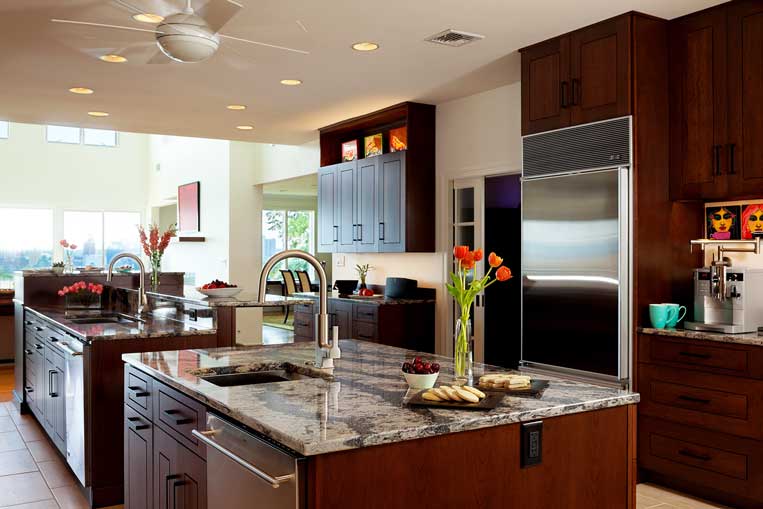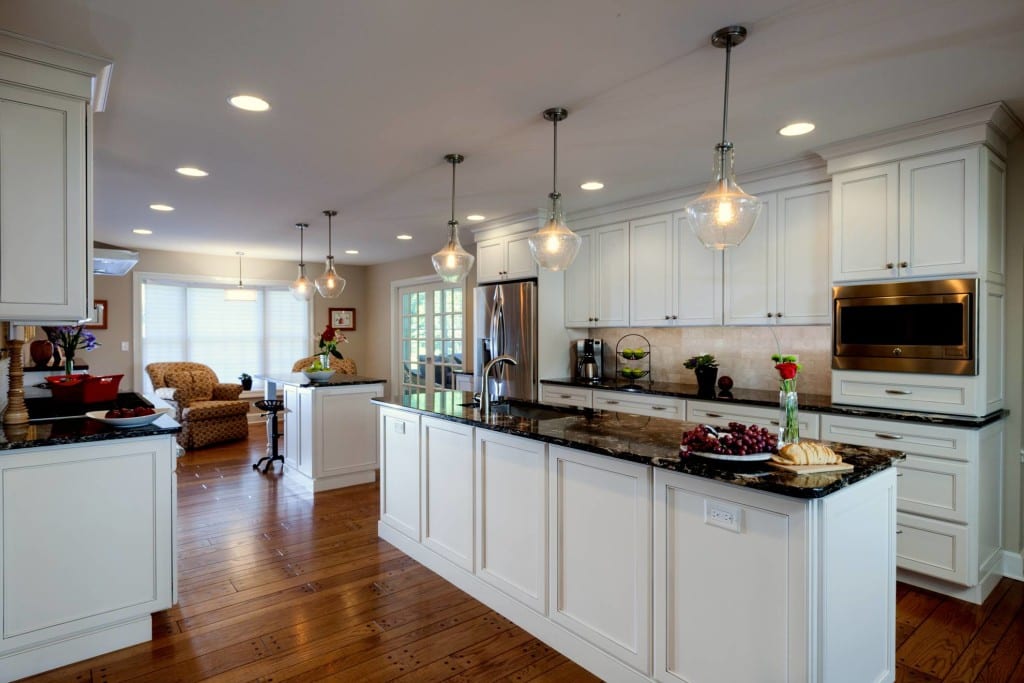Different Paths to a Kitchen Remodel
According to Houzz, within 10 miles of Harrisburg, PA, there are nearly 100 architects, designers and design/build firms offering kitchen and bath remodeling services. Kitchen renovation can and should be a rewarding experience, but understanding the alternative project delivery methods and choosing the one that fits your needs is often the key to success. This is your guide to help determine what design and construction process to choose.

In general the process by which you renovate a kitchen can be described as design-bid-build (competitive bid), design/build, or a hybrid approach of the two.
Design-Bid-Build Remodeling
With the traditional design-bid-build approach, an architect is first hired to generate a project design, solicit and manage bids and help choose a contractor to execute the work. Once a contractor is chosen, the homeowner creates a separate agreement with the contractor, forming a project team of the architect, builder and homeowner. Those who favor this process suggest several benefits including:
- A more thorough discovery and design process
- Comprehensive drawings and plans with a higher level of specificity
- Checks and balances to insure homeowner satisfaction
Design-bid-build kitchen remodeling begins with a discovery phase led by the architect. During this time a homeowner’s functional needs and wants are discussed at length and evaluated in the context of the existing home and remodeling project budget. It is at this early stage when the design-bid-build process can lead to superior results.
A thoughtful architect will move past the numbers and check lists and engage the owners in a frank discussion about family, friends, pets, patterns passions and aspirations. They are not talking simply about how many children the client has, or where they do their homework. An experienced architect might ask, “Your children will be entering high school in a few years. Are you looking for a kitchen where their friends and they would want to gather?” The answer, truthfully, could go either way, but the critical point is that insight beyond the obvious was offered.
Working with an architect first can also lead to a more comprehensive and detailed set of drawings. Because the drawings are the foundation of an effective bidding process, an architect has an interest in making them as complete as possible. In addition, a thorough set of plans helps provides the homeowner with protection, should a construction dispute arise later on.
Finally, design-bid-build remodeling proponents suggest that by having an architect and contractor beholden to the homeowner, checks and balances exist keeping both professionals focused on owner satisfaction.
Design/Build Kitchen Remodeling
There’s no question that residential design/build firms have seen steady growth in the past decade, positioning themselves as a more efficient and effective alternative to traditional design-bid-build processes. While it’s possible for an architect or kitchen design firm to lead a design-build program, the typical design/build firm has its roots in the construction side of the business. Design/build firms also tend to be larger companies, having designers, project managers and parts of the construction team as permanent employees. (Tradespeople, however, will likely still be hired from outside of the organization.)
Proponents of the design/build project process point to the following benefits:
- Single point of responsibility and contact
- Faster timeline due to the elimination of the bidding process
- Lower, more predictable cost of construction
- Greater collaboration between design and construction
There’s no question that for most homeowners, having a single point of contact and responsibility can make the process of remodeling a kitchen less stressful. When an architect and contractor disagree, the homeowner can be caught in the middle without sufficient expertise to judge “who’s right.” What competitive bid advocates call checks-and-balances, design/build firms call a recipe for conflict.
Most agree that the bidding process can take several weeks and this means that the remodeling timeline is extended. Because there is no bidding amongst contractors in the design/build process, you eliminate the time, cost and effort required. In addition, with the design-bid-build method a homeowner does not know the construction price of the project until it goes out to bid. This uncertainty can put the original design or choices at risk, if the bids come in above the maximum budget.
Because design/build firms often provide a guaranteed maximum price and save cost by eliminating bidding, advocates suggest that design/build can have both a lower cost and higher level of budget certainty.
Finally, design/build firms will point to the collaboration that’s fostered between designers and contractors. An example often used is that a contractor might have a more efficient method or better material than what an architect has specified. By working on the same team, both are more open to making and receiving suggestions that save the homeowner money or improve the finished product.
The Case for a Hybrid Approach to Kitchen Remodeling
There is a third group of professionals who believe that a hybrid approach to kitchen remodeling projects is often the best. Advocates of combining the positive features of design-bid-build and design/build point to the following benefits:
- A single point of responsibility and contact
- Faster project completion
- Predictable cost of construction
- Specialization that leads to a better design
While it’s certainly possible to have a kitchen designer bid out a project to several contractors, it’s far more common for the kitchen design firm to take full responsibility for the project. Like a design/build process, this single point of contact can reduce homeowner stress and improve cooperation between designers and installers. Similarly, without the cost in time and money of a bidding process, hybrid project delivery also shortens the timeline when compared to design-bid-build. Finally, like design/build projects, kitchen design firms can offer a guaranteed maximum price, providing the homeowner with a predictable price of construction.

Specialized Kitchen Design Skills That Lead to Better Design
Having a kitchen design firm lead the discovery and design phase can and should lead to a finished plan that benefits from the unique focus, expertise and experience of the kitchen and bath designer. Design/build firms normally tackle all manner of renovation and new construction projects including additions, basements, garages, etc. While this doesn’t mean a design/build firms design team can’t create a lovely kitchen, it does mean that their continuing education and expertise is spread over a number of disciplines. Some knowledge and skill sets overlap between the design of a garage and a kitchen, but others do not.
Similarly, kitchen design standards that have seemed timeless for decades are suddenly being redefined. For example, a recent NKBA survey suggests that large showers are gaining favor over bathtubs. While the big shower vs. bathtub trade-off might have been a simple economic answer just a year or two ago, the recommendation to the homeowner might be very different today.
The bottom line is that a professional whose sole focus is on the art and science of kitchen and bath design might have very different answers than an architect or design/build firm who must pay attention to a number of specialized home spaces.
Kitchen Designer as General Contractor
An obvious point is that the hybrid process of kitchen remodeling utilizes the kitchen designer as general contractor. Design/build firms with construction roots sometimes point to this as a weakness of the hybrid approach. A designer’s experience and expertise in managing kitchen remodeling projects is a legitimate concern that should be considered when evaluating the different project delivery methods.
Perhaps the best way to evaluate the project management skills of not just a kitchen designer but also a design/build firm is to review their past projects and speak with customers both satisfied and perhaps less so. It is likely your best guarantee that anyone you choose is up to the task of being an effective construction manager.
The Right Solution for The Homeowner
In the end, any of these three kitchen remodel processes can deliver a beautiful, functional space that provides years of enjoyment. How involved the homeowner wants to be, their level of expertise, and the comfort they have with each professional will determine the appropriate project delivery method.
